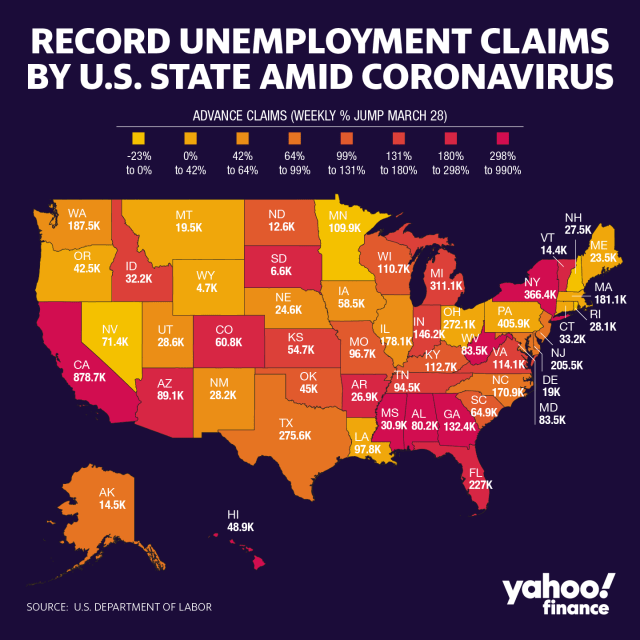The U.S. economy is struggling right now.
On Thursday, we learned that initial filings for unemployment insurance totaled a record 6.648 million for the week ending March 28, more than doubling the prior week’s reported total of 3.238 million that had also marked a record high. Distressingly, last week’s data was also revised higher on Thursday to 3.307 million.
And while the labor market fallout from the coronavirus-related economic hard-stop we’re experiencing has been the most abrupt and severe so far, economists at Bank of America Global Research believe the broader economic downturn we’re entering will result in the worst recession in modern U.S. history.
“The recession appears to be deeper and more prolonged than we were led to believe just 14 days ago when we last updated our forecasts, not just in the U.S. but globally as well,” said BofA economists led by Michelle Meyer.
“We now believe that there will be three consecutive quarters of GDP contraction with the US economy shrinking 7% in 1Q, 30% in 2Q and 1% in 3Q. We expect this to be followed by a pop in growth in 4Q. We forecast the cumulative decline in GDP to be 10.4% and this will be the deepest recession on record, nearly five times more severe than the post-war average.” (Emphasis added.)
In 2008, the economy experienced a cumulative recessionary decline in GDP of 4%, the most since World War II. BofA is expecting the 2020 recession will be more than twice as severe in terms of the total GDP decline.
The labor market impacts are also expected to be eye-popping as the recession crests in the summer.
Bank of America expects that up to 20 million people will lose their jobs through the third quarter with the unemployment rate potentially peaking north of 15%.
“The shock is unlike anything we have experienced before with part of the economy effectively put into an induced coma,” BofA adds.
“The pain is sudden and acute. But we think there is a recovery on the other side. The first step is to solve the public health crisis and stop the spread of COVID-19. The next step is to slowly open the economy with businesses returning and people going back to work.”
Bank of America expects that GDP will pop 30% in the fourth quarter. But the firm still believes “this will be a slow recovery overall as many workers will be displaced and businesses adapt to a period of lost revenue.”
The consumer economy stumbles
Over the last few years, when questions about the Federal Reserve’s actions and the health of the global economy came into question, investors became accustomed to citing the strength and health of the U.S. consumer as the backbone of the bull market and economic expansion.
And indeed, just under 70% of GDP growth comes from consumer spending. Since the fourth quarter of 2013, no single quarter has seen U.S. consumer spending rise less than 3%.
But this trend looks set to come to an end.
Using its proprietary data that tracks spending from Bank of America debit and credit cardholders, Meyer and her team note that by the end of March about 20% of consumer spending categories had declined more than 40%.
“It makes sense that the consumer cut back [in March],” Meyer and team write.
“Part of the decline was ‘forced’ since non-essential businesses closed in many regions, automatically cutting sales. And as consumers sheltered at home, their needs change. But we also think it reflects a broader weakness for the consumer as they face job cuts and a significant negative wealth shock. This naturally leads to more cautious behavior.”
The debate around what the period after coronavirus will look like in the U.S. economy still centers on three letters: V, U, and L. Each letter outlines a path for the economic recovery post-virus.
But as Meyer’s commentary outlines, recessions change just about everything about consumer behavior. And boiling these changes down to one letter is futile. When recessions hit, workers that retain a job grow more worried about losing their job. Consumers with exposure to the stock market have seen their net worth decline. And the collective economic memory we all share shifts from recalling recent periods of relative prosperity to the darkest days of restaurants, bars, and shops closing overnight.
And all of these combine to create an environment in which consumers are more cautious and spending is restrained. To the extent that “animal spirits” powered increases in spending during expansions, a recession short circuits these trends.
Data challenges
Like most economists writing about the coronavirus-related slowdown, BofA also notes that capturing the extent of the economic fallout from the coronavirus poses several challenges.
That’s particularly true given the speed and magnitude of the changes mandated by lawmakers and the lag on which economic data is reported.
“There are two things to remember here,” Meyer’s team writes with respect to the data likely to be reported over the next months and quarters. “First, we are reporting the quarterly GDP figures as an annualized quarterly change. So don’t be taken by the 30% drop in 2Q, it is really a 8.5% decline from one quarter to another rather than the economy shrinking by a third in one quarter.”
Yahoo Finance’s Rick Newman recently wrote about how to think about the annualized data set to be reported later this year.
“The other consideration,” Meyer writes, “is that it may be difficult for the Bureau of Economic Analysis (BEA) to capture the degree of weakness given the reliance on surveys and historical interpolations. During the last recession, it took several releases with downward revisions before the depth of the downturn was understood.” (https://news.yahoo.com/us-economy-entering-deepest-recession-on-record-172304066.html)






































